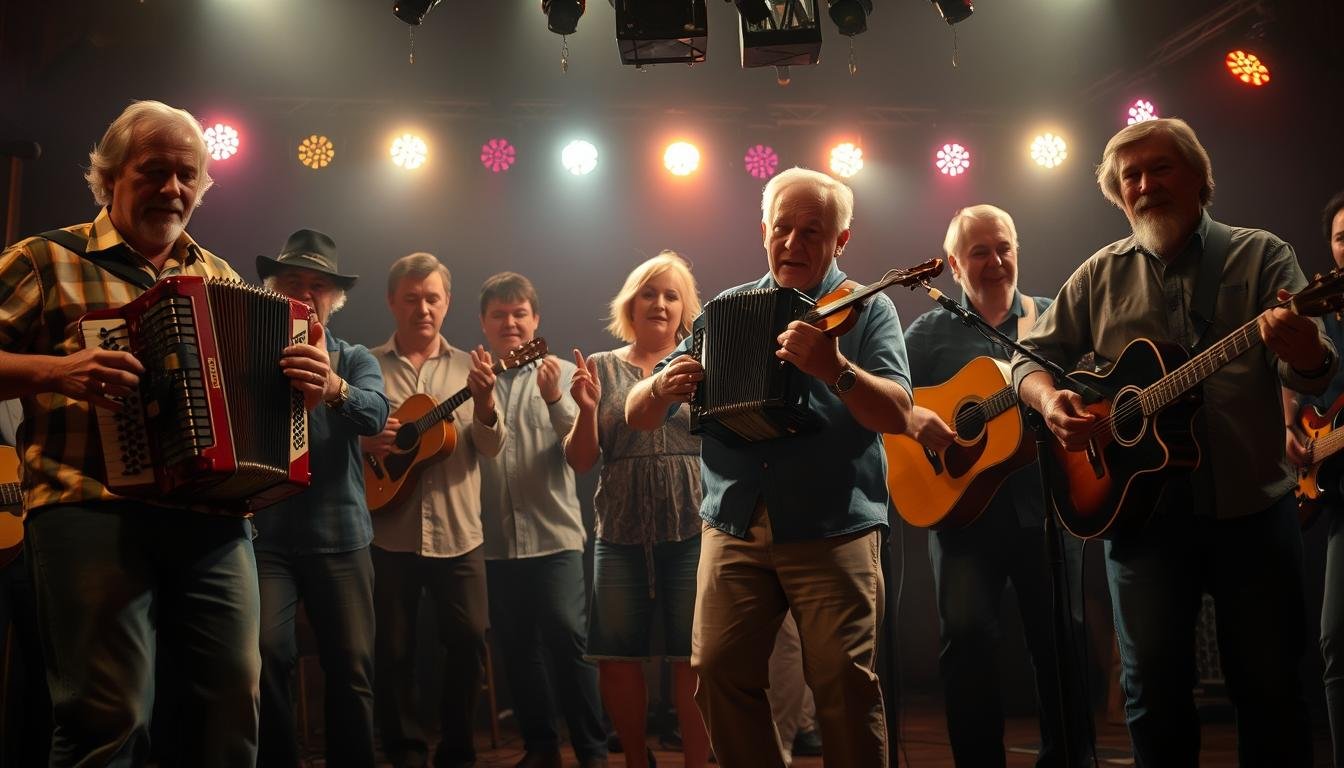As a local, I’m excited to share with you the rich heritage of Louisiana culture through its vibrant Cajun rhythms. Growing up in this city, I’ve witnessed firsthand how this genre is more than just a style of music – it’s a reflection of our history, traditions, and the spirit of our community.
The unique sound of Cajun music has been shaped by the city’s cultural melting pot, blending French, Spanish, and African influences. As we explore this genre, you’ll discover the significance of Cajun music in New Orleans, from its origins to the prominent musicians who keep the tradition alive.
Key Takeaways
- Understanding the roots of Cajun music and its connection to Louisiana culture
- Exploring the distinctive sound that sets Cajun music apart
- Discovering prominent Cajun musicians who have shaped the genre
- Learning about popular festivals that celebrate Cajun music
- Experiencing the role of Cajun music in New Orleans’ cultural identity
The Origins of Cajun Music in New Orleans
The story of Cajun music begins with the Acadian people, whose legacy continues to influence the genre. As we explore the roots of this vibrant music, it’s essential to understand the cultural and historical context that shaped it.
The Influence of Acadian Culture
The Acadians, French-speaking people who originally settled in Nova Scotia, brought with them their rich musical traditions. When they migrated to Louisiana, they merged their culture with the existing musical landscape, creating a unique sound. This blend of influences laid the groundwork for what we now know as Cajun music, characterized by its lively rhythms and accordion-driven melodies.
The Acadian culture’s impact on Cajun music is evident in its storytelling style, where songs often narrate historical events, love stories, and everyday life. This narrative tradition has been passed down through generations, keeping the Acadian heritage alive in the heart of Louisiana’s music scene.
Key Historical Events
Historical events, such as the Acadian exile, played a significant role in shaping Cajun music. The exile, which occurred in the mid-18th century, forced the Acadians to relocate, bringing their musical traditions to new areas. This displacement not only influenced the development of Cajun music but also infused it with the cultural practices of the regions they encountered.
The resilience and adaptability of the Acadian people are reflected in the evolution of Cajun music, as it absorbed various influences while maintaining its core identity. This dynamic process has contributed to the genre’s richness and diversity.
Early Instruments Used
Early Cajun music was characterized by the use of traditional instruments such as the accordion and fiddle. The accordion, in particular, became a staple of Cajun music, providing the genre’s distinctive sound. The fiddle, with its ability to produce lively, danceable tunes, complemented the accordion, creating a unique musical blend.
These instruments were not only central to the sound of Cajun music but also played a crucial role in its social functions, such as community gatherings and dances. The lively rhythms and melodies produced by these instruments helped to foster a sense of community and celebration.
As we delve into the origins of Cajun music, it becomes clear that the genre is a testament to the cultural resilience and creativity of the Acadian people and their descendants. The blend of Acadian traditions with other influences has resulted in a unique musical heritage that continues to thrive in New Orleans and beyond.
The Distinctive Sound of Cajun Music
Cajun music’s distinctive sound is a sensory journey through the heart of Louisiana’s bayou country. This genre is characterized by its rich cultural heritage and the blending of various musical traditions. The result is a unique sound that resonates deeply with listeners.
The instruments used in Cajun music play a crucial role in defining its distinctive sound. Traditional instruments such as the accordion, fiddle, and triangle are staples of the genre. The accordion provides a lively, driving rhythm, while the fiddle adds melodic depth and the triangle punctuates the beat with a crisp, percussive sound.
Instruments That Define the Genre
The instrumentation in Cajun music is a key element that sets it apart from other genres. The combination of traditional instruments creates a rich, layered sound that is both lively and soulful.
- The accordion is often considered the heart of Cajun music, providing a robust and energetic foundation.
- The fiddle adds a melodic layer, often playing lively tunes that complement the accordion.
- The triangle, with its sharp, percussive sound, adds a dynamic element to the rhythm.
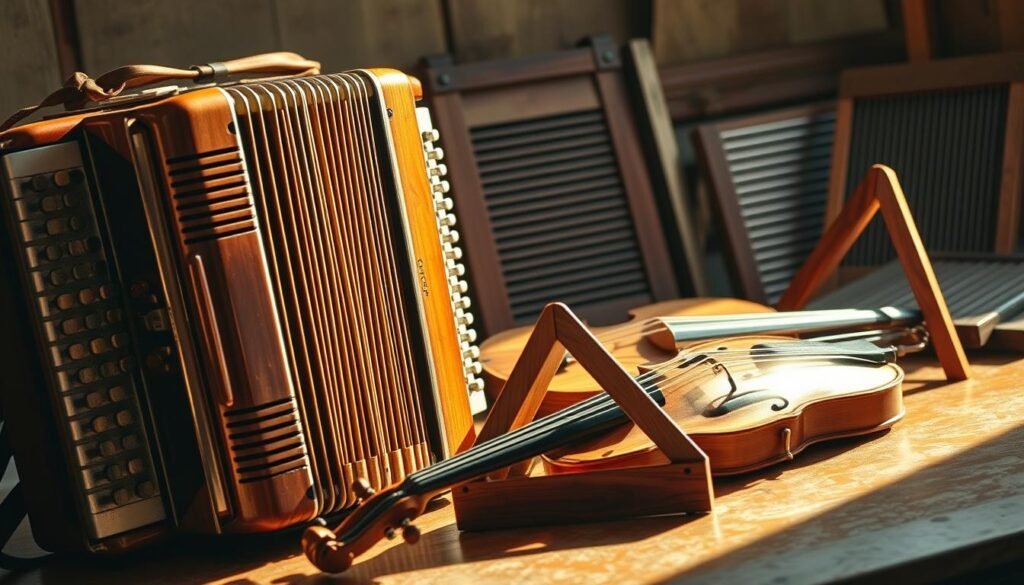
The Role of Vocals and Lyrics
Vocals and lyrics are equally important in defining the sound of Cajun music. The genre is known for its heartfelt, storytelling style of singing, often in French, which adds to the music’s authenticity and emotional impact.
The lyrics typically revolve around themes of love, life, and the struggles of the Cajun people. The soulful delivery of these stories through song creates a deep connection with listeners, making the music feel both personal and communal.
“Cajun music is not just about the melody; it’s about the story behind the song, the history, and the culture.”
By combining traditional instruments with heartfelt vocals and storytelling, Cajun music creates a unique sonic experience that is deeply rooted in the culture and history of Louisiana’s bayou country.
Prominent Cajun Musicians to Know
New Orleans’ Cajun music scene owes its vibrancy to a diverse range of musicians, from old guard to new talent. These artists have been instrumental in shaping the genre, blending traditional French Quarter melodies with the soulful swamp rhythms that define Cajun music.
Legends of Cajun Music
The foundation of Cajun music is built on the shoulders of legends like Nathan Abshire and Lawrence Arcenaux. These pioneers not only kept the Acadian musical traditions alive but also influenced generations to come. Their contributions to the genre are immeasurable, with Abshire’s accordion-driven tunes being a staple of Cajun music.
Another significant figure is Canray Fontenot, known for his mastery of the fiddle. His ability to weave together traditional Cajun tunes with his own stories and experiences has made him a beloved figure in the community.
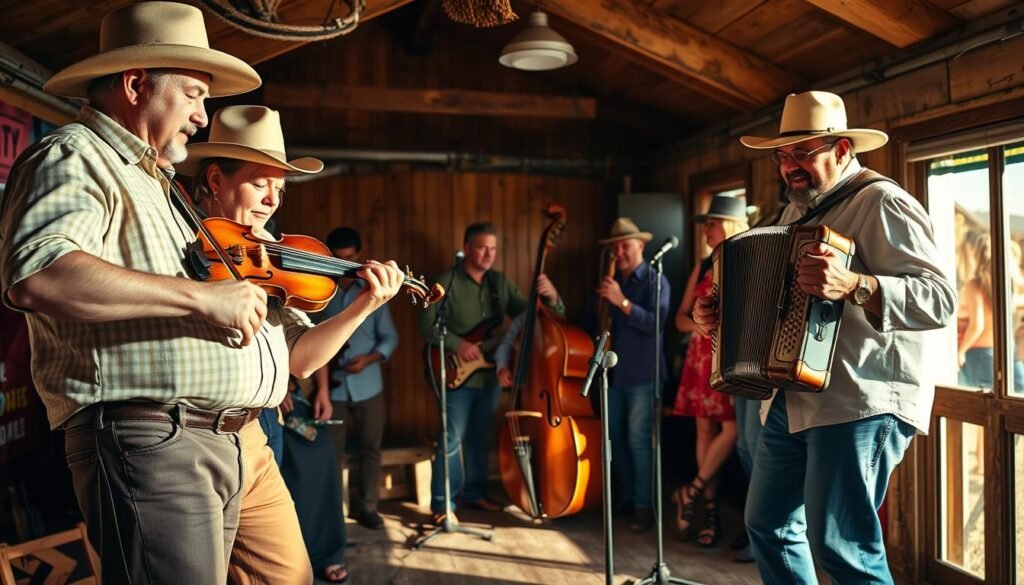
Contemporary Artists Making Waves
While traditional Cajun music remains cherished, contemporary artists are pushing the genre forward. Steve Riley and the Mamou Playboys are a prime example, blending traditional Cajun sounds with modern influences. Their music appeals to both long-time fans of the genre and new listeners alike.
Other notable contemporary artists include Michael Doucet and Zachary Richard, who have been instrumental in innovating and preserving Cajun music. Their work not only honors the past but also looks towards the future, incorporating diverse musical elements into their work.
Community Contributions
The Cajun music community is rich with individuals dedicated to preserving and promoting the genre. Local music schools, cultural centers, and festivals all play a crucial role in keeping Cajun music alive. These community efforts ensure that the next generation of musicians has the resources and support needed to continue the traditions.
Moreover, the communal aspect of Cajun music – with its emphasis on shared stories, dances, and celebrations – fosters a strong sense of identity and belonging among its practitioners and fans. This communal spirit is at the heart of Cajun music’s enduring appeal.
Popular Cajun Music Festivals
The spirit of Cajun music comes alive in New Orleans through its numerous festivals that celebrate Louisiana’s unique culture. These events are a fantastic way to experience the city’s rich musical heritage, bringing together locals and visitors alike to enjoy the lively rhythms and melodies.
Bayou Country Superfest
The Bayou Country Superfest is a highlight of New Orleans’ festival calendar, featuring a lineup of talented Cajun and country musicians. This event is a celebration of the region’s music, with performances that showcase the genre’s signature sounds and styles. Attendees can expect an energetic atmosphere, with top artists taking to the stage to perform their latest hits and classic favorites.
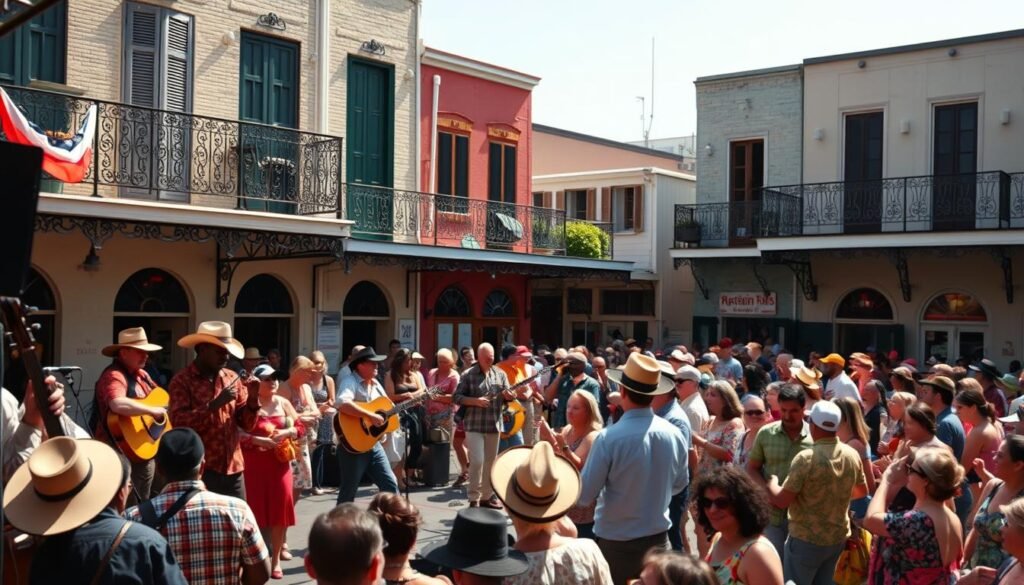
Festival International de Louisiane
As one of the largest cultural festivals in the United States, the Festival International de Louisiane is a must-attend event for anyone interested in Cajun music and Louisiana culture. This five-day festival features a diverse range of performances, from traditional Cajun and Zydeco to contemporary acts. It’s an opportunity to immerse yourself in the sounds and spirit of the region, with music, dance, and food all playing a central role.
New Orleans Jazz & Heritage Festival
The New Orleans Jazz & Heritage Festival, while not exclusively a Cajun music event, is a significant celebration of the city’s musical heritage, including its Cajun and Zydeco traditions. The festival brings together a wide range of local and international artists, offering a unique blend of musical styles and cultural experiences. With its diverse lineup and lively atmosphere, it’s an event that showcases the best of New Orleans’ music scene.
In conclusion, New Orleans’ Cajun music festivals are a vibrant expression of the city’s cultural identity, offering something for everyone. Whether you’re a long-time fan of Cajun music or just looking to experience the city’s unique cultural heritage, these festivals are not to be missed.
How Cajun Music Shapes New Orleans Culture
From cuisine to dance, Cajun music plays a pivotal role in defining the cultural landscape of New Orleans. This genre is not just a form of entertainment; it’s a way of life that influences various aspects of the city’s identity.
Connection to Local Cuisine
Cajun music is often at the heart of social gatherings, where local cuisine takes center stage. The rhythm and beats of zydeco music, a genre closely related to Cajun music, complement the rich flavors of Creole heritage dishes. For instance, during a traditional cochon de lait (suckling pig) party, the lively tunes keep the atmosphere vibrant, encouraging everyone to dance and enjoy the culinary delights.
| Cajun Dish | Typical Event | Associated Music |
|---|---|---|
| Gumbo | Family Gatherings | Zydeco |
| Jambalaya | Festivals | Cajun |
| Boudin | Community Events | Traditional Cajun |
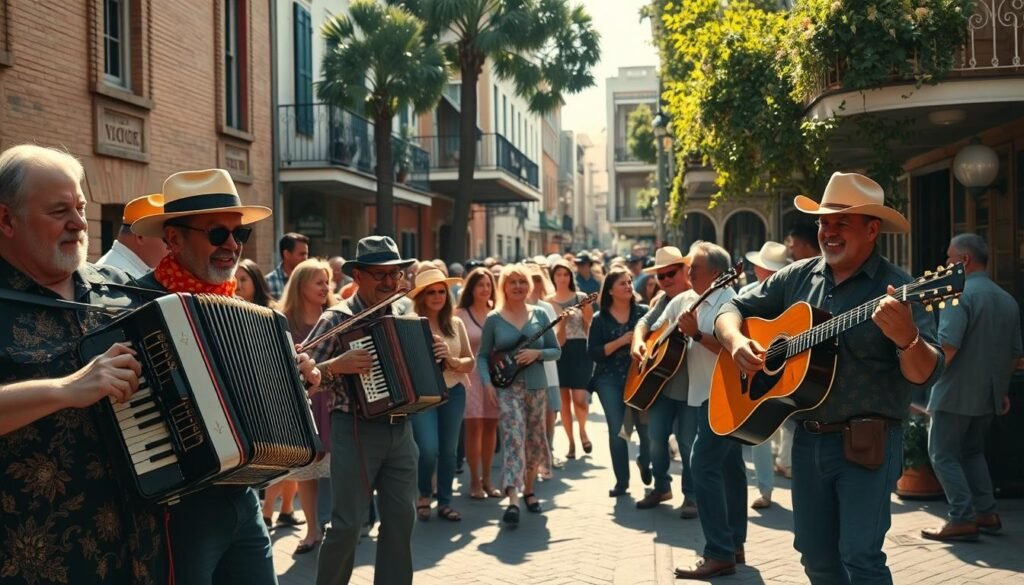
Influence on Dance and Social Gatherings
Cajun music is inherently linked to dance, with its upbeat tempo encouraging lively movements. The two-step and waltz are popular dances at Cajun social gatherings, where the music creates an infectious energy that draws everyone in. This connection between music, dance, and community is a hallmark of New Orleans culture, fostering a sense of unity and celebration.
Preservation of Cultural Heritage
The preservation of Cajun music is crucial to maintaining the cultural heritage of New Orleans. By keeping this tradition alive, the community ensures that its history and values are passed down to future generations. Efforts to document and promote Cajun music, such as through festivals and educational programs, play a vital role in this preservation process.
In conclusion, Cajun music is a cornerstone of New Orleans culture, influencing everything from local cuisine to social gatherings. Its impact is a testament to the genre’s significance in shaping the city’s unique identity.
The Evolution of Cajun Music
The evolution of Cajun music is a story of adaptation and innovation, shaped by the rich cultural heritage of Louisiana. As a genre, it has managed to stay relevant by embracing change while retaining its traditional roots.
Fusions with Other Genres
Cajun music has never existed in a vacuum; it’s been influenced by and has influenced other genres. One notable fusion is with zydeco, a genre that emerged from the same cultural melting pot. This blend has resulted in a unique sound that’s both traditional and contemporary. For instance, artists like BeauSoleil have successfully merged Cajun music with zydeco and rock elements, creating a fresh yet rooted sound.
The fusion doesn’t stop there; Cajun music has also been blended with other styles, such as southern folk music and even elements of rock. This eclecticism has helped keep the genre vibrant and appealing to a broader audience. As noted in an article on Cajun music’s history in the twentieth, the genre’s ability to adapt has been key to its survival.
- Fusion with zydeco
- Incorporation of rock elements
- Blending with southern folk music
The Impact of Technology
Technology has played a pivotal role in the evolution of Cajun music, especially in how it’s produced, distributed, and consumed. Recording equipment has become more accessible, allowing artists to produce high-quality music without the need for large budgets. Moreover, social media and streaming platforms have opened up new avenues for artists to reach global audiences.
This technological advancement has not only changed how music is made but also how it’s shared and enjoyed. Fans can now access bayou tunes from anywhere in the world, contributing to the genre’s global appeal.
Changing Audience Perceptions
As Cajun music evolves, so do audience perceptions. There’s a growing appreciation for the genre’s rich cultural heritage and its contribution to the diverse musical landscape of the United States. Contemporary artists are not only preserving traditional sounds but also innovating, making the genre appealing to new generations.
The adaptability of Cajun music ensures its continued relevance in the modern music scene. As audience tastes change, the genre continues to evolve, incorporating new styles while maintaining its essence.
Learning to Play Cajun Music
Cajun music isn’t just about listening; it’s about getting involved and playing along with the French Quarter melodies. As someone who’s grown up surrounded by the vibrant culture of New Orleans, I can attest to the joy of picking up an instrument and joining in on a Cajun tune.
To start, you’ll need to familiarize yourself with the traditional instruments that define Cajun music. The accordion and fiddle are staples of the genre, and mastering either one will give you a solid foundation.
Traditional Instruments for Beginners
When it comes to choosing your first instrument, consider the following:
- Accordion: The accordion is a great choice for beginners because it provides a full sound and is relatively easy to learn. Its versatility allows you to play both melody and accompaniment.
- Fiddle: The fiddle is another popular choice, offering a rich, expressive sound that’s central to Cajun music. While it may take some time to develop proper bowing techniques, the fiddle’s melodic capabilities make it a rewarding instrument to learn.
Both instruments have their unique charm, and you can’t go wrong with either choice. Many Cajun musicians start with the accordion because of its ability to produce a full, rich sound that’s characteristic of the genre.
Online Resources for Aspiring Musicians
In today’s digital age, learning to play Cajun music is easier than ever, thanks to the wealth of online resources available. Here are a few places to start:
- YouTube Tutorials: Websites like YouTube offer a vast array of tutorials and lessons for beginners. You can find videos on everything from basic accordion techniques to advanced fiddle playing.
- Online Courses: Platforms like Udemy and Coursera sometimes offer courses on music theory and specific genres, including Cajun music. These can be a great way to deepen your understanding of the music.
- Music Communities: Joining online forums or social media groups dedicated to Cajun music can connect you with other musicians and provide valuable feedback on your playing.
With dedication and the right resources, you can become a part of the rich tradition of Cajun music. So, pick up an instrument, find some online tutorials, and start playing along with the swamp rhythms that make New Orleans so unique.
Where to Experience Cajun Music Live in New Orleans
New Orleans is the heartbeat of Cajun music, where the rhythm comes alive in the city’s vibrant music scene. As a local, I’ve had the privilege of experiencing the rich cultural heritage of Cajun music firsthand, and I’m excited to share with you the best places to enjoy it live.
Iconic Venues and Clubs
New Orleans is home to a variety of iconic venues that showcase Cajun music. The Blue Nile is a favorite among locals, offering an intimate setting to enjoy live Cajun and zydeco music. Another must-visit is the Howlin’ Wolf, a larger venue that hosts a range of Cajun and zydeco acts, from local legends to international artists.
For a more laid-back atmosphere, head to Preservation Hall, where you can enjoy Cajun music in an intimate, historic setting. While it’s primarily known for jazz, Preservation Hall occasionally features Cajun and zydeco performances that are not to be missed.
Tips for Finding Authentic Performances
To experience the most authentic Cajun music, look for performances by local musicians who are deeply rooted in the tradition. Events featuring traditional instrumentation, such as the accordion and fiddle, are a good bet. You can also check out local dance halls and community centers, where Cajun music is often played during social gatherings and dance events.
Another tip is to attend Cajun and zydeco festivals, which take place throughout the year in New Orleans. These festivals are a fantastic way to experience the music, culture, and community all in one place. With a little insider knowledge, you can enjoy the best of Cajun music in the city that loves it most.
The Future of Cajun Music in a Global Context
As Cajun music continues to resonate globally, its future is being shaped by the intersection of tradition and innovation. The genre, deeply rooted in Creole heritage and characterized by its lively zydeco music, is adapting to new cultural landscapes.
The global connectivity offered by the digital age is opening up fresh avenues for Cajun music. Artists are now able to share their work with a broader audience, transcending geographical boundaries.
Digital Platforms and Social Media
Social media has emerged as a powerful tool for Cajun musicians, enabling them to reach new fans and promote their music. Platforms like YouTube, Facebook, and Instagram are not just marketing channels but also spaces where artists can engage with their audience, share their creative processes, and build a community around their music.
“Social media has been a game-changer for us. It allows us to connect directly with our fans and share our culture with a global audience.” – A local Cajun musician
The role of social media in the future of Cajun music cannot be overstated. It provides a medium for the genre to evolve while retaining its authenticity. As Cajun music’s cultural significance continues to be recognized, its online presence is likely to grow, introducing the genre to new listeners.
Emerging Trends and Styles
Cajun music is not static; it is evolving with emerging trends and styles. The fusion of Cajun music with other genres is creating new and exciting sounds. This blending of traditions is not only enriching the genre but also making it more appealing to a diverse audience.
| Trend | Description | Impact |
|---|---|---|
| Fusion with Other Genres | Blending Cajun music with genres like jazz, rock, and hip-hop. | Attracts a broader audience and creates new sounds. |
| Digital Music Production | Using technology to produce and distribute music. | Increases global reach and accessibility. |
| Cultural Exchange | Collaborations between Cajun artists and musicians from other cultures. | Enriches the genre and promotes cultural understanding. |
As we look to the future, it’s clear that Cajun music will continue to thrive, driven by the creativity of its artists and the enthusiasm of its global fanbase. The genre’s ability to adapt while remaining true to its roots is a testament to its enduring appeal.
Resources for Cajun Music Lovers
For those drawn to the soulful sounds of Cajun music, there’s a wealth of resources to explore. Delving into the world of bayou tunes and southern folk music can be a rich experience, with many albums, playlists, documentaries, and books offering a deeper understanding of this unique genre.
Discovering New Sounds
Recommended albums and playlists are a great way to discover new artists and styles within the realm of Cajun music. From traditional swamp rhythms to modern fusions, these resources can introduce you to the diversity and complexity of this southern folk music.
Exploring the History and Culture
Documentaries and books provide a fascinating insight into the history and cultural significance of Cajun music. By exploring these resources, you can gain a deeper appreciation for the genre and its role in shaping the identity of New Orleans and its people.
FAQ
What’s the difference between Cajun and zydeco music?
Cajun music originates from the white Acadian people, while zydeco comes from the black Creole community. Both genres share similarities, but Cajun music tends to be more accordion-driven, whereas zydeco often features a more prominent keyboard or rubboard sound. You can experience the unique energy of both styles at local festivals like the New Orleans Jazz & Heritage Festival.
How do I experience authentic Cajun music in New Orleans?
To experience authentic Cajun music, head to iconic venues like the Blue Nile or the Howlin’ Wolf, where local musicians often perform. You can also attend festivals like the Bayou Country Superfest or the Festival International de Louisiane, which showcase the best of Cajun music. Don’t be afraid to join in on a traditional Cajun dance, like the two-step or waltz, to get a feel for the culture.
What’s the significance of the accordion in Cajun music?
The accordion is a staple instrument in Cajun music, bringing a unique, lively sound to the genre. Its portability and expressive qualities made it a natural fit for Cajun musicians, who often played at social gatherings and dances. The accordion’s influence can be heard in the swampy rhythms and bayou tunes that define the genre.
Can I learn to play Cajun music if I’m not from Louisiana?
Absolutely! While having Cajun heritage can be helpful, it’s not necessary to be from Louisiana to learn and appreciate the music. You can start by taking lessons on traditional instruments like the accordion or fiddle, and practice with online resources or local music groups. With dedication and a willingness to learn, you can become a part of the rich tradition of Cajun music.
How has Cajun music influenced other genres?
Cajun music’s influence can be heard in various genres, from rock to country. The unique rhythms and instrumentation have inspired many artists, and the genre’s emphasis on storytelling has shaped the way musicians approach songwriting. You can hear the echoes of Cajun music in the southern folk and roots rock scenes, where artists continue to draw on the genre’s rich heritage.
What’s the connection between Cajun music and Louisiana cuisine?
Cajun music and Louisiana cuisine are closely tied, as both reflect the region’s cultural heritage. Traditional Cajun dishes like gumbo and jambalaya are often served at social gatherings where music is played, and the lively rhythms and flavors blend together to create a unique cultural experience. You can taste the connection at local restaurants, where the sounds of Cajun music often accompany the aromas of spicy Creole cooking.
Are there any Cajun music festivals in New Orleans that are suitable for families?
Yes, many Cajun music festivals in New Orleans are family-friendly, with activities and entertainment for all ages. The New Orleans Jazz & Heritage Festival, for example, features a kids’ area with music, crafts, and food, making it a great event for families to enjoy together. You can also expect to find traditional Creole cuisine and zydeco dancing, which are sure to delight both kids and adults.
